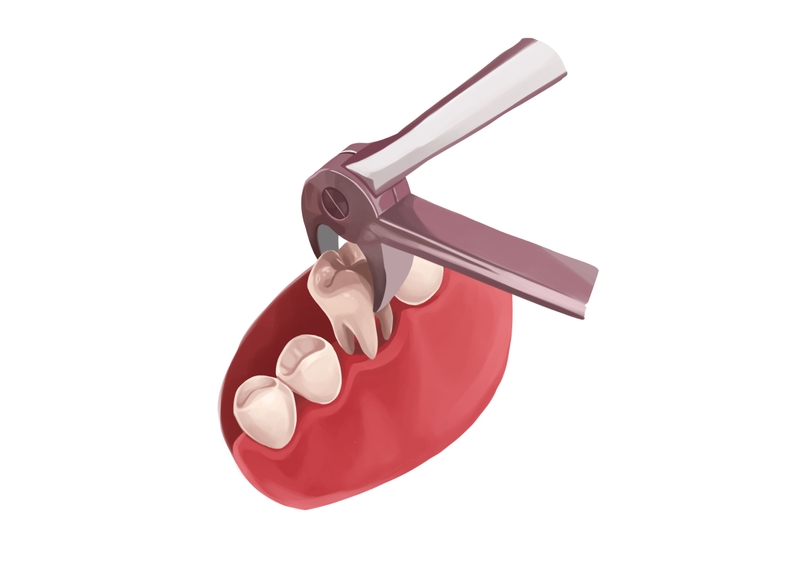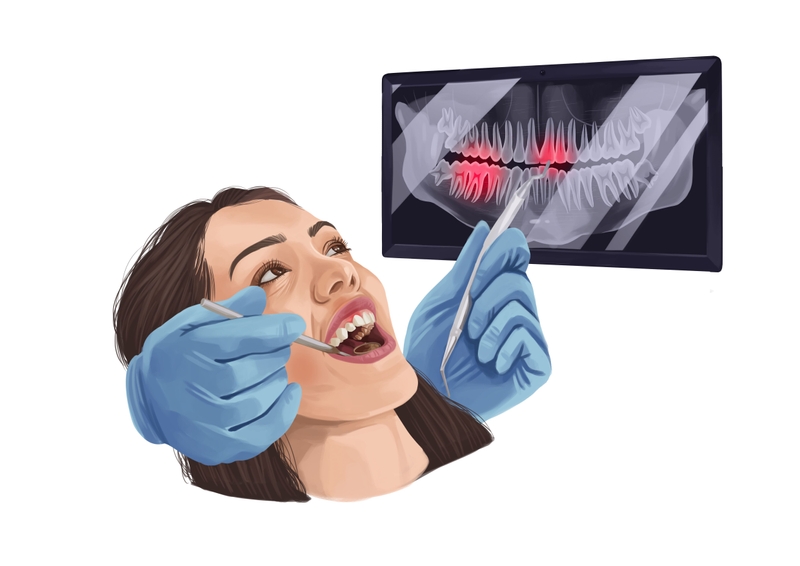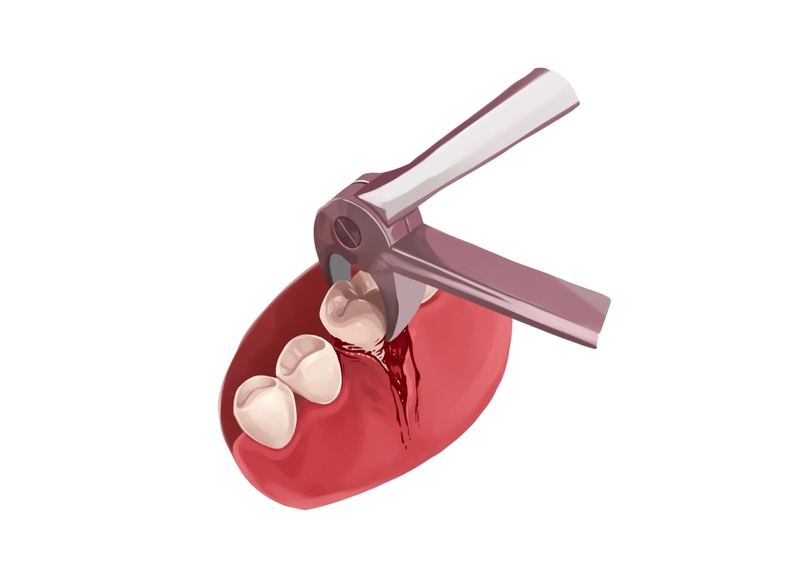- A simple tooth extraction costs between $50 and $500. Extracting an impacted tooth can cost up to $1,100. You may have to pay extra for dental exams, X-ray and sedation.
- The cost of a tooth extraction depends on the type of extraction, the complexity of the procedure and the type of anesthesia.
- Dental insurance may cover about half the cost of a tooth extraction.
Use Authority Dental to find affordable dental services and save big on tooth extraction.
Wondering how much a tooth extraction costs? See average prices for simple, surgical, impacted, and wisdom tooth extractions, with and without insurance.
Average tooth extraction cost without insurance

Picture by Authority Dental under CC 2.0 license
The factors that impact the price of tooth extraction most are:
the complexity of the dental procedure,
the type of extraction needed,
the type of anesthesia that is needed, and
whether the extraction is being done by a specialist, like an oral surgeon or a board certified dentist, and of course,
the treatment plan your dental insurance covers.
| EXTRACTION TYPE | AVERAGE COST | COST RANGE |
|---|---|---|
| Simple | $200 | $50-$500 |
| Surgical | $300 | $200-$700 |
| Impacted tooth, soft tissue | $350 | $250-$850 |
| Impacted tooth, partially bony | $450 | $300-$950 |
| Impacted tooth, fully bony | $550 | $350-$1,100 |
| Broken tooth | $350 | $200-$600 |
| Coronectomy | $600 | $250-$1,000 |
| Baby tooth | $150 | $100-$500 |
As shown in the table above, the estimate for an simple tooth extraction or a surgical extraction involves a broad range. Due to the nature of the procedure, it is impossible to say exactly what the cost will be until the work is completed since there are many types of tooth extractions.
Simple extractions and the removal of baby teeth tend to be the cheapest, usually not exceeding $500 at the high end. These prices also apply to decayed tooth extraction if the tooth is fully visible and there are no complications. Broken tooth extraction may be slightly more expensive, typically priced between $200 and $600.
More expensive procedures include impacted tooth removal and coronectomy, which is a third molar extraction with preservation of the tooth roots.
For impacted teeth, the level of impaction determines the price of the procedure. Soft tissue impaction costs the least, averaging around $350, while the price of wisdom tooth extraction with fully bony impaction costs about $550 on average. For coronectomy, the cost ranges between $250 and $1,000.
Associated costs of tooth extraction

Picture by Authority Dental under CC 2.0 license
During your appointment, your dentist might decide that you need additional procedures to prepare for the extraction.
| PROCEDURE | AVERAGE COST | COST RANGE |
|---|---|---|
| Dental exam | $100 | $50-$200 |
| Panoramic X-ray | $130 | $100-$250 |
| Periapical X-ray | $35 | $25-$50 |
| Cone beam CT | $330 | $150-$750 |
| Laughing gas | $90 | $40-$150 |
| Moderate sedation | $250 | $100-$500 |
| Deep sedation | $270 | $150-$450 |
Below are some of the most common procedures associated with tooth extraction.
Oral evaluation
Pulling a tooth out is not a decision you can make by yourself. Before your tooth is extracted, you are likely to undergo a dental examination, which can incur an extra cost of between $50 and $200. During this visit, a dentist will assess the condition of your teeth. It may happen that a simple cavity filling will be enough to save your tooth. It will be a lot cheaper than an extraction.
This oral evaluation is a good opportunity to find out what needs to be done and how much it might cost. You can ask about the optimal type of anesthesia for your case.
Make sure to let your dentist know about your medical history. Man-made heart valves, a congenital heart defect, an impaired immune system, or liver disease could all make your extraction more complicated.
Dental X-rays
The cost of dental X-rays is something you have to consider for simple extractions. Your dental professional will need to inspect your teeth, the surrounding structures and tissues, and the direction of root growth. Extractions cannot be performed without an X-ray image taken recently.
A radiograph can also help detect impaction and crowding. What’s more, they can help visualize third molars and enable the dentist or orthodontist to see them in 3D.
You can expect one or more of the following dental X-rays before your extraction procedure:
a panoramic X-ray,
a periapical X-ray, or
a cone beam CT.
The cost of imaging depends on the specific technology used. A periapical X-ray is on the lower end, priced at $25–$50, while a cone beam CT is the most expensive. Its price can range from $150 to $750.
Anesthesia
Anesthesia is a big topic in tooth extraction. A topical numbing agent in the form of a shot is usually administered. This is included in the price of your procedure. There are, however, other options.
If you have dental anxiety, or if the extraction is more complicated, you might want IV or even general anesthesia. The more intensive the sedation, the more expensive the extraction procedure.
What’s more, all types of anesthesia other than a topical injection are charged according to how much has to be used. This can make them even more expensive, as it is hard to determine how long the procedure will last before it starts.
In the case of the more intense forms, there are additional costs that you have to think about that could potentially raise the tooth extraction cost. These include childcare or transportation since you might not be able to drive yourself home or return that night.
The typical price range for anaesthesia starts at $40–$150 for laughing gas and goes up to $450 in more expensive cases of deep sedation.
Note that tooth extraction aftercare may require additional expenses. Often, it is necessary to pay for follow-up dental visits to check the healing process and remove stitches if they are non-dissolvable. In more complex cases, you may need to take post-extraction X-rays as well.
Tooth extraction aftercare also usually involves taking antibiotics. Depending on the level of discomfort you experience, you might also need to purchase pain relievers or anti-inflammatory drugs. These pharmaceuticals typically cost $20–$80.
Does insurance cover tooth extraction costs?

Picture by Authority Dental under CC 2.0 license
Dental insurance might cover about half of the cost. This means that if the regular extraction costs $200 at your dentist’s, the tooth extraction cost with insurance will be around $100.
Adult Medicaid covers tooth extraction in almost every state. If you are over 65, caring for a child, or if you have a disability, you might qualify.
There are yearly maximums to take into account too. Tooth extractions can get you up to that maximum pretty quickly, especially with anesthesia. That means your insurance won’t cover anything else for the rest of the year.
It’s important to remember that there are always limitations to pre-existing conditions. That means that if you knew you had to remove your tooth before your insurance was active, they might not cover any costs. Some policies also have a year-long waiting period for initial coverage.
As regards the additional costs, some insurance providers pay for a full series of X-rays once every three years. Taking radiographs is vital, as they are proof that a tooth needed to be extracted. If you don’t have one, your provider might refuse to cover anything.
A good way to lower all of your costs is seeking for more affordable tooth extractions through dental discount plans. These work similarly to memberships. You pay a regular fee and get a discount on all dental procedures. There is no paperwork or yearly maximums.
Dental plans can save you money, even if it turns out your extraction will be one of the more complicated ones. You don’t need to prove that the extraction is medically necessary. They cover all procedures, even cosmetic ones. No need to collect X-rays and dentist statements anymore.
FAQ
What affects tooth extraction price the most?
The type of extraction that is performed and the kind of anesthesia used are the two most important factors determining the price. The more complex the removal is, the more it will cost.
A local injection is included in the price for the procedure. If you have dental anxiety or a low pain tolerance, you should be prepared to pay a lot more.
Is it cheaper to get a tooth pulled or filled?
A dental filling is a lot more affordable than pulling a tooth.
It is not always possible to choose a filling over an extraction, however. While the dentist will do everything they can to save a tooth, an extraction is sometimes necessary.
Where can I get my tooth pulled for free?
It may be difficult to find a place where someone trained will extract your tooth for free, but it is possible.
Most dental schools look for volunteers for students to practice on. It is completely safe, as the procedure is always overseen by a licensed professional. The only downside is that it may take a little longer than usual.
Another option is to find a free clinic or a dental practice that has a promotional or open day. You can also check current programs of non-profit organizations such as the Dental Lifeline Network or Dentistry from the Heart.
How much does an emergency tooth extraction cost?
Emergency treatment usually costs the same as what the practice charges normally. The average price for an extraction is about $200 if you go with a local injection. If you need a stronger form of sedation the price can double.
Sometimes it may only be possible to visit an ER. That will cost you a lot more.
How much does a tooth extraction with a bone graft cost?
It is a combined procedure, and its cost will depend on the type of tooth extraction needed as well as the graft type used. The prices for tooth removal vary between $50 and $1,100. The cost of grafts starts from around $550 in the case of a xenograft, or animal donor bone, and can exceed $5,000 if an autograft, or your own bone, is used.
For example, if your tooth is removed surgically for $300 and a synthetic graft priced at $600 is used, the cost will sum up to $900 without insurance. However, real prices in your particular scenario may differ significantly from the example.
You should also keep in mind that you will likely need additional procedures like X-rays, anesthesia, and more dental appointments. All of them will contribute to the total cost.